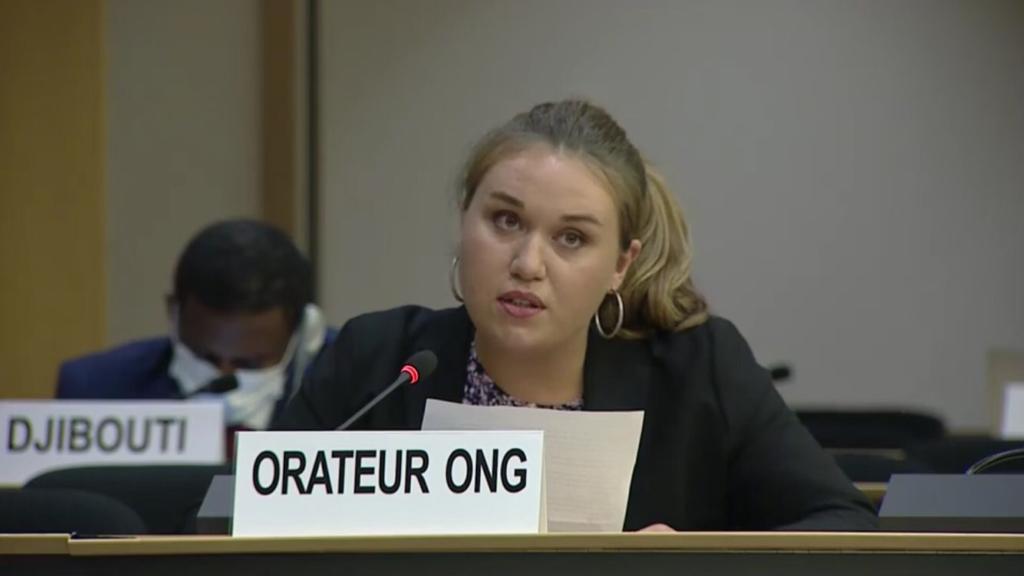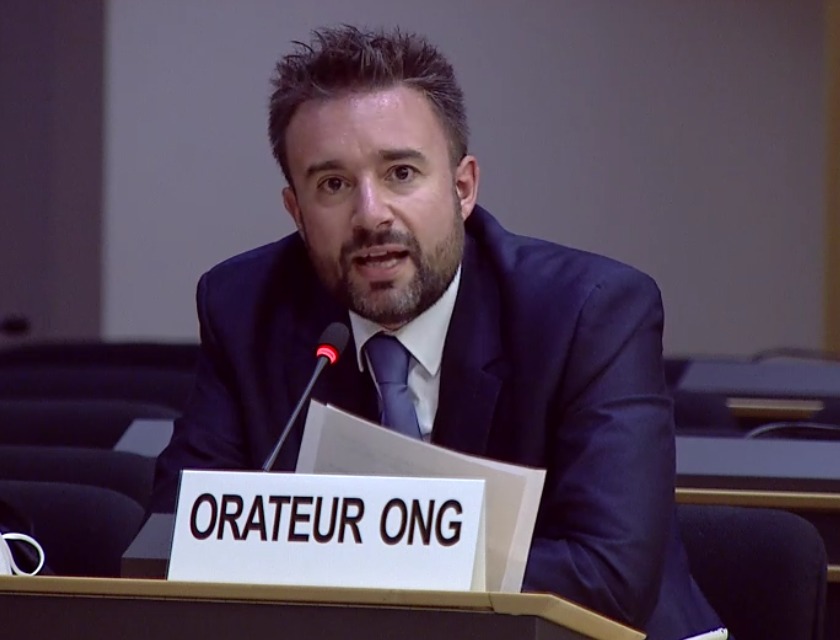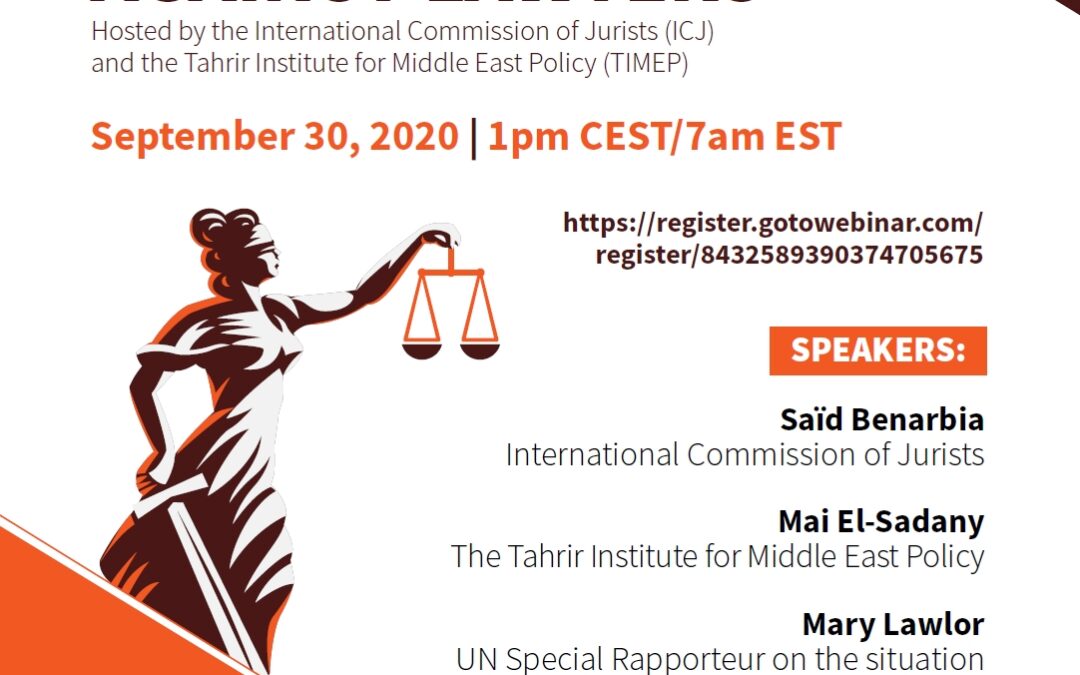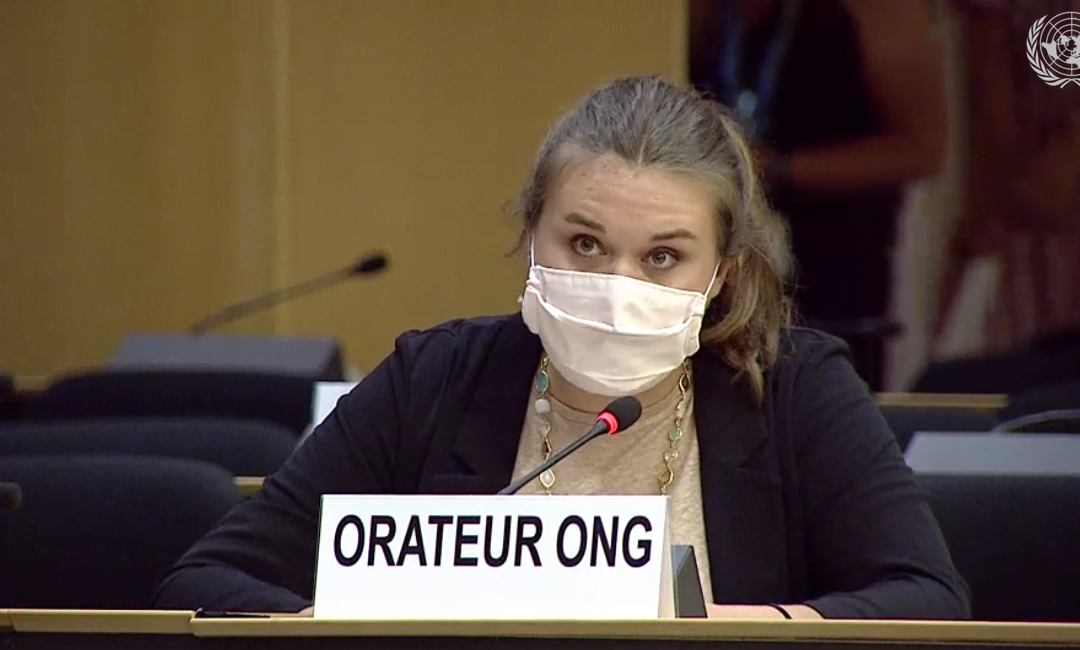
Sep 29, 2020 | Advocacy, Non-legal submissions
At the Human Rights Council, the ICJ today highlighted the problem of abuse of counter-terrorism laws to perpetrate reprisals against those who cooperate with the UN, including particularly by Egypt.
The oral statement was delivered in a general debate on human rights bodies and mechanisms (item 5), and read as follows:
“Madame President,
The International Commission of Jurists (ICJ) welcomes the report of the Secretary General on Cooperation with the United Nations, its representatives and mechanisms in the field of human rights (A/HRC/45/36). The ICJ particularly concurs with its conclusion that reprisals perpetrated through abuse of national security and counter-terrorism laws and measures continue at alarming levels (para 131), and that such abuse also frequently occurs in the context of broader repressive environments for civil society or dissent (para 132).
While the report documents such abuses in a number of countries, the pattern of abuse of such laws by the government of Egypt presented in the report should be of particular concern to this Council (paras 65 to 70, Annex I paras 40 to 51, Annex II paras 44 to 53).[1] Further relevant cases from Egypt continue, including shortly before this session began.
These reprisals resonate with broader patterns of abuse of counter-terrorism and national security laws in Egypt, including for instance targeting lawyers, which are also severely exacerbated by the lack of independence of the judiciary in Egypt, particularly in the special terrorism court circuits.
Madame President, these patterns of abuse only further illustrate and underscore civil society’s concern with the role Egypt seeks for itself on issues of terrorism and human rights at the Council. In that regard, we reiterate our concerns about the pending report of the Advisory Committee, responding to the request it received under the last Egypt-led separate resolution on “the effects of terrorism” (resolution 34/8) to report on “the negative effects of terrorism on the enjoyment of all human rights and fundamental freedoms, with a particular focus on economic, social and cultural rights, including as a result of diverting foreign direct investment, reducing capital inflows, destroying infrastructure, limiting foreign trade, disturbing financial markets, negatively affecting certain economic sectors and impeding economic growth.”
The Human Rights Council should not, Madame President, countenance such attempts to divert and dilute its limited resources and attention away from the most acute issues on this theme from a human rights perspective: preventing and responding to violations in countering terrorism and a human-rights based approach to victims of terrorism.”
[1] Underlying documents in a number of cases mentioned in A/HRC/45/36 reveal further links to abuses of counter-terrorism and national security laws: see e.g. A/HRC/39/31 para 38 and Annex I paras 32-35; A/HRC/27/38, para 24; A/HRC/36/31 para 33 and Annex I, para 34; and A/HRC/39/31 Annex II, paras 17-18, 21.

Sep 29, 2020 | Advocacy, Non-legal submissions
The ICJ and IHOP today put the spotlight the lack of independence of the judiciary and the abuse of criminal and anti-terrorism laws in Turkey, speaking at the UN Human Rights Council in Geneva.
The statement, made during the consideration of the Universal Periodic Review (UPR) of Turkey, reads as follows:
The International Commission of Jurists (ICJ) and the Human Rights Joint Platform (IHOP) welcome the acceptance by Turkey of recommendations to ensure the independence of the judiciary (recommendations 45.112, 45.113, 45.114, 45.115, 45.118, 45.120, 45.121, 45.124, 45.125, 45.126, 45.127, 45.128, 45.129, 45.132, 45.133).
The ICJ and IHOP however regret to report that, based on their research and experience, the statements by the Turkish Government that the recommendations on the independence of the judiciary have already been implemented is simply not correct.
On the contrary, during the state of emergency more than 4000 judges and prosecutors were dismissed, more than 2000 judges and prosecutors were detained, through arbitrary processes that did not meet international standards.
The judiciary in Turkey does not enjoy basic guarantees of institutional independence because its Council of Judges and Prosecutors is fully appointed by the Legislative and Executive powers contrary to international standards on judicial independence.
The ICJ and IHOP further regret that Turkey only noted and did not explicitly support the recommendations to reform its penal and counter-terrorism legislation in line with international standards on freedom of expression (recommendations 45.90, 45.91, 45.92, 45.93, 45.94, 45.95, 45.96, 45.97, 45.98, 45.99, 45.100, 45.101, 45.102, 45.103, 45.104, 45.148, 45.158).
The statement by the Government that “legal amendments have already been adopted” and that these laws are in line with international standards is also fundamentally incorrect.
Anti-terrorism laws and other criminal offences continue to be abused to unjustifiably prosecute political opposition members, judges, lawyers, prosecutors and human rights defenders.
To actually implement the recommendations accepted by Turkey, ICJ calls on Turkish authorities to
- radically reform the governance of the judiciary to restore its independence in line with international standards;
- promptly finalize all criminal and administrative cases concerning former judges and prosecutors, respecting international standards of judicial independence;
- truly reform the country’s anti-terrorism law, and
- stop all arbitrary prosecution of human rights defenders, lawyers, judges, prosecutors and academics.
Contact:
Massimo Frigo, ICJ Senior Legal Adviser, e: massimo.frigo(a)icj.org, t: +41797499949

Sep 28, 2020 | Events, News
Join this panel discussion with ICJ, the Tahrir Institute, and the UN Special Rapporteur on human rights defenders, Wednesday 30 September 2020, 13:00.
Targeting the Last Line of Defense:
Egypt’s attacks against lawyers
A Virtual Side Event to the Human Rights Council 45th Session
Wednesday 30 September 2020, 13:00 – 14:30 (Geneva time)
The International Commission of Jurists (ICJ) and the Tahrir Institute for Middle East Policy (TIMEP) cordially invite you to join this online side event, including the UN Special Rapporteur on human rights defenders, this coming Wednesday.
The ICJ and TIMEP will present their joint report Targeting the last line of defense: Egypt’s attacks against lawyers. The report documents systematic targeting of lawyers through arbitrary arrests and detention, physical assaults, torture and enforced disappearances, as well as politicized criminal proceedings under counter-terrorism and other overbroad laws.
In the report, the ICJ and TIMEP call on the Egyptian authorities to immediately end their crackdown on lawyers and to unconditionally release all lawyers who are detained or convicted solely on the basis of the peaceful exercise of their human rights and/or the legitimate discharge of their professional duties.
Speakers:
- Mary Lawlor, UN Special Rapporteur on the situation of human rights defenders
- Saïd Benarbia, International Commission of Jurists
- Mai El-Sadany, The Tahrir Institute for Middle East Policy
Register for the event here:
https://attendee.gotowebinar.com/register/8432589390374705675.
For more information contact: un(a)icj.org

Jun 30, 2020 | Advocacy, Non-legal submissions
Speaking at the UN Human Rights Council today, the ICJ urged action on longstanding and pervasive impunity for human rights violations in the Philippines and highlighted new threats posed by a pending new counter-terrorism law.
The oral statement, delivered in an interactive debate on the human rights situation in the Philippines based on a report prepared by the High Commissioner for Human Rights, read as follows:
“Madame President,
The International Commission of Jurists (ICJ) concurs with the High Commissioner’s finding that overemphasis by the Government of the Philippines on national security and public order has led to serious human rights violations (A/HRC/44/22, para 12). Such violations will only increase if the draft Anti-Terrorism Act is approved and implemented.
The draft law would, for example, allows detention without judicial warrant for up to twenty-four days. Such prolonged pretrial detention without judicial review This is inconsistent with the prohibition of arbitrary detention under the International Covenant on Civil and Political Rights (ICCPR), and the right under the ICCPR of anyone arrested or detained on criminal grounds to be brought promptly before a judge. The Human Rights Committee has stressed that such judicial control of initial detention periods is not only essential to guarantee the right to liberty but also to prevent torture, other ill-treatment, and enforced disappearance.
In line with both the High Commissioner’s report and the 25 June 2020 statement by a large number of Special Procedures, the ICJ urges the Government of the Philippines to accept the findings and recommendations and rapidly implement corrective measures, in cooperation with the OHCHR, civil society, and the Commission on Human Rights, and to abandon or fundamentally revise the draft Anti-Terror Law. In the absence of clear, effective and measurable progress on accountability at the national level, this Council must stand ready to establish an independent international investigation (para 88(iii)).
Thank you.”

Mar 5, 2020 | Advocacy, Non-legal submissions
The ICJ today expressed concern at violations of human rights perpetrated in the name of countering violent extremism, and at attempts by some States at the Human Rights Council to dilute its focus on human rights while countering terrorism and the human rights of victims of terrorism.
The statement, delivered during an interactive dialogue with the UN Special Rapporteur on the promotion and protection of human rights and fundamental freedoms while countering terrorism, read as follows:
“The International Commission of Jurists (ICJ) welcomes your report on “Human rights impact of policies and practices aimed at preventing and countering violent extremism” (A/HRC/43/46).
The ICJ shares concern at the growing range of measures that restrict human rights, adopted in the name of the opaque and contested concepts of countering or preventing violent extremism. At the Council, certain States push for agreed language on suppression of terrorism to be cut-and-pasted to apply to “violent extremism”, and then eventually to all “extremism” whether violent or not, without definitions. As your report documents, at the national level this translates into overbroad, unjustified, arbitrary, and discriminatory measures, with particular impacts on civil society, especially human rights defenders, and from a gender perspective.
We also share the view expressed at para 51 of your report, that the current draft report of the Human Rights Council Advisory Committee on “the negative effects of terrorism on the enjoyment of human rights”, remains fundamentally flawed. Any discussion of “effects of terrorism” at the Council should exclusively focus on a human-rights based approach to victims of terrorism, consolidating work already undertaken by successive Special Rapporteurs and other UN and regional entities, as collected in a compilation published recently by the ICJ.[1] The Council must not allow its attention and limited resources to be diverted away from the human rights of victims of terrorism and protecting human rights while countering terrorism, to more diffuse questions of a macro-economic or budgetary character or duplicating work of other bodies.”
[1] See https://www.icj.org/victimsofterrorism2019/ and https://www.icj.org/icj-highlights-rights-of-victims-of-terrorism-to-un-delegations/









